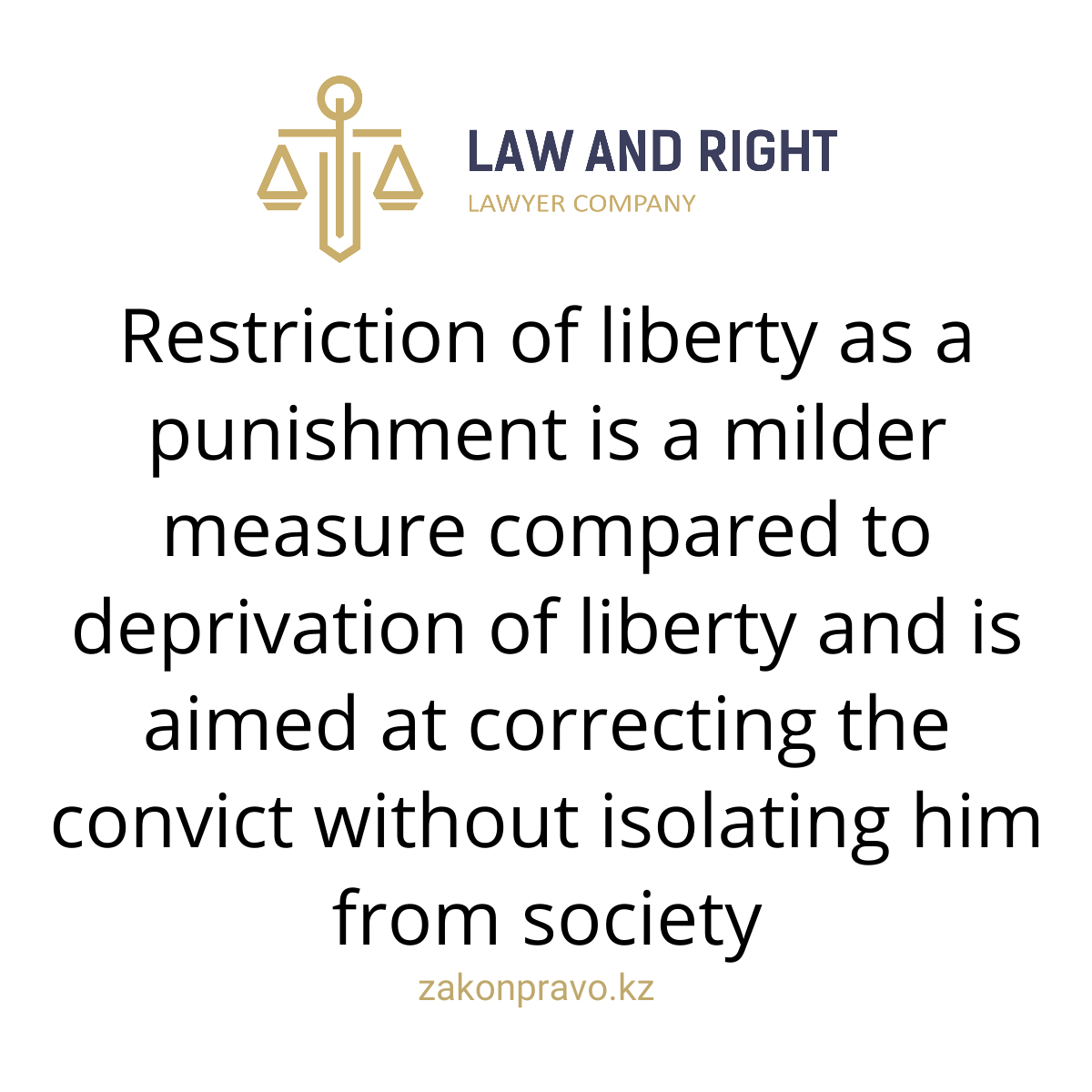Restriction of liberty as a punishment is a milder measure compared to deprivation of liberty and is aimed at correcting the convict without isolating him from society
Restriction of liberty is a type of criminal punishment consisting in the establishment of control over the convict and his involvement in forced labor, but without isolation from society. This punishment is regulated by Article 44 of the Criminal Code of the Republic of Kazakhstan (CC RK) and is provided for certain categories of offenders as an alternative to deprivation of liberty.
Commentary on the provisions of the article:
1. The sentence may be imposed for a period of 6 months to 7 years, and during this time the convict is subject to probation control. This is mandatory supervision carried out by state bodies, including the probation service. Convicts are involved in forced labor, which should be 100 hours annually. It is noteworthy that involvement in labor is carried out only in public places, under the control of local executive bodies.
Exemption from labor is provided for a number of categories of citizens, including minors, pregnant women, women and men raising young children, as well as persons with disabilities. If the punishment is imposed for a period of less than 6 months, the convict is released from the obligation to perform forced labor.
1. Obligations of the convict.
Probation control may include various obligations: not to change the place of residence or work without notification, not to visit certain places, to undergo treatment (for example, for drug addiction or sexually transmitted diseases), as well as to support the family. These obligations are formed in order to correct the convict and to prevent him from committing further offences. Violation of the conditions of control may lead to the replacement of punishment with a more severe one - imprisonment.
2. Replacement with imprisonment.
In case of malicious evasion from serving the sentence (for example, ignoring the conditions of probation control), the remaining term of restriction of liberty may be replaced by imprisonment. Substitution is carried out in a one-to-one ratio – one day of imprisonment for one day of restriction of liberty.
3. Imposition of a milder punishment.
In some cases, if the court recognizes mitigating circumstances (for example, an incomplete crime or circumstances specified in Article 55 of the Criminal Code of the Republic of Kazakhstan on the imposition of a milder punishment), the punishment may be imposed within the limits less than the minimum period of restriction of liberty (less than 6 months).
Application of the norms and clarifications of the Supreme Court
The Regulatory Resolution of the Supreme Court of the Republic of Kazakhstan No 2 dated March 27, 2020 "On the Practice of Sentencing" provides clarifications on the imposition of punishments, including cases of the use of restriction of liberty. In particular, the resolution clarifies that the imposition of punishment must comply with the principle of justice (Article 52 of the Criminal Code of the Republic of Kazakhstan), and the imposition of restrictions on freedom must take into account the personality of the convict, his attitude to the committed crime, and other circumstances of the case.
Also, the Regulatory Resolution of the Supreme Court of the Republic of Kazakhstan dated June 25, 2015 No 4 clarifies the application of probation control. The resolution states that probation control should be a real and effective tool for the correction of a convict, and not just a formal obligation.
Conclusion
Restriction of liberty as a punishment is a milder measure compared to deprivation of liberty and is aimed at correcting the convict without isolating him from society. However, evasion of the conditions of punishment may lead to its replacement with imprisonment.
Attention!
Law and Law Law Law draws your attention to the fact that this document is basic and does not always meet the requirements of a particular situation. Our lawyers are ready to assist you in legal advice, drawing up any legal document suitable for your situation.
For more information, please contact a Lawyer / Attorney by phone: +7 (708) 971-78-58; +7 (700) 978 5755, +7 (700) 978 5085.
Attorney at Law Almaty Lawyer Legal Services Legal Advice Civil Criminal Administrative Cases Disputes Protection Arbitration Law Firm Kazakhstan Law Office Court Cases


